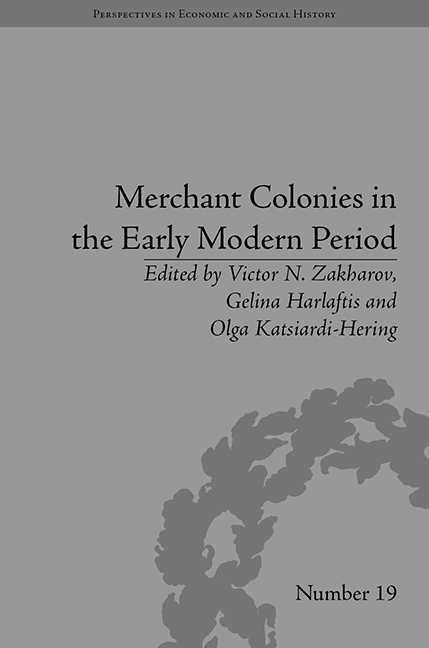Book contents
- Frontmatter
- Contents
- List of Figures and Tables
- List of Contributors
- Introduction
- 1 Early Modern English Merchant Colonies: Contexts and Functions
- 2 German and Italian Merchant Colonies in Early Modern England
- 3 Dynamism and Integration of the North European Merchant Communities in French Ports in the Eighteenth Century
- 4 Opportunity and Legislation: How the Armenians Entered Trade in Three Mediterranean Ports
- 5 Russian Merchant Colonies in Seventeenth-Century Sweden
- 6 Foreign Merchant Communities in Eighteenth-Century Russia
- 7 Greek Merchant Colonies in Central and South-Eastern Europe in the Eighteenth and Early Nineteenth Centuries
- 8 Community for Commerce: An Introduction to the Nezhin Greek Brotherhood Focusing on its Establishment as a Formal Institution in the Years Between 1692 and 1710
- 9 Entrepreneurship at the Russian Frontier of International Trade. The Greek Merchant Community/Paroikia of Taganrog in the Sea of Azov, 1780s–1830s
- Notes
- Index
7 - Greek Merchant Colonies in Central and South-Eastern Europe in the Eighteenth and Early Nineteenth Centuries
- Frontmatter
- Contents
- List of Figures and Tables
- List of Contributors
- Introduction
- 1 Early Modern English Merchant Colonies: Contexts and Functions
- 2 German and Italian Merchant Colonies in Early Modern England
- 3 Dynamism and Integration of the North European Merchant Communities in French Ports in the Eighteenth Century
- 4 Opportunity and Legislation: How the Armenians Entered Trade in Three Mediterranean Ports
- 5 Russian Merchant Colonies in Seventeenth-Century Sweden
- 6 Foreign Merchant Communities in Eighteenth-Century Russia
- 7 Greek Merchant Colonies in Central and South-Eastern Europe in the Eighteenth and Early Nineteenth Centuries
- 8 Community for Commerce: An Introduction to the Nezhin Greek Brotherhood Focusing on its Establishment as a Formal Institution in the Years Between 1692 and 1710
- 9 Entrepreneurship at the Russian Frontier of International Trade. The Greek Merchant Community/Paroikia of Taganrog in the Sea of Azov, 1780s–1830s
- Notes
- Index
Summary
In recent years, the economic, administrative and social historiography of the Greek diaspora has flourished, especially with regard to the Greek communities of central Europe. It has evolved as part of a vibrant methodological discourse built upon migration, network-systems and colonial/postcolonial studies. The title of the volume of which this paper forms part refers to ‘merchant colonies’ and their importance in European international trade in the early modern period (late fifteenth–eighteenth centuries). Consequently, we will be discussing the trade undertaken by foreign merchants to and through central Europe, especially those who established themselves in that area in the eighteenth and early nineteenth centuries. We should begin by explaining the geographical and geopolitical context in this area during the period in question. The term ‘colony’ occupies a central place in this volume, and needs to be explained and compared with others such as ‘nation’ (Nation/Гἕνοζ), ‘establishment’ (Niederlassung/paroikia), ‘community’ (comunità/Gemeinde/ϰοινότητα), ‘confraternity’ (Confraternità/Bruderschaft/Αδελϕότητα) and ‘companies’ (compagnie/Gesellschaften). The merchant colonies in central Europe, which were part of the south-eastern European Orthodox diaspora, should be examined in terms of the conflicts, as well as the convergences, between the two – and after the late eighteenth century, three – empires with territory in central Europe, and of developments in their respective economic policies.
I am using the term ‘central Europe’ to denote the space delimited by the city-port of Trieste and the Transylvanian lands of the Carpathians, with small ‘deviations’ as far as the Black Sea.
- Type
- Chapter
- Information
- Merchant Colonies in the Early Modern Period , pp. 127 - 140Publisher: Pickering & ChattoFirst published in: 2014



